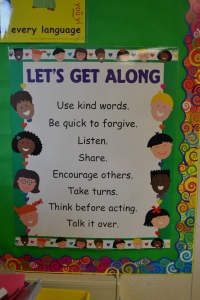InterACT: Closing the Generation Gap in Our Unions
Teachers are tribal people. We build a nice little fortress and stay inside as much as possible, defending the gates when necessary. This tribalism has saved us in an ever-shifting landscape, but it’s got its limitations and it may soon be the cause of our demise. The two big tribes now are Old Generation and Next Generation teachers, and the most obvious place of need is our local unions. The Next Gen teachers are attracted by the glamour of the reform groups and the promise of an amplified voice; the Old Gen prefers the lunchroom and the union hall. Over the last school year I’ve gotten the chance to hang out with 58 Next Gen teachers from 17 states, courtesy of the NEA. I’ve learned that we’re lined up on either side of a generation gap that is worlds apart, but that each side is a critical part of the equation. We need each other more than we will benefit from sticking with our tribe.

Because the origins of unions are rooted in staying alive in a hostile environment, the Old Generation totally gets the need for protection, collective bargaining and the need to jump up and down once in a while. The Old Gen safeguards everyone’s rights whether they like it or not – experience has taught them that careers are subject to the whim of the public, politicians, and now philanthropists. We once did believe that our good work would be our protection from harm or unfair practices; we never saw the need for pensions or fully-funded health benefits as youngsters. And then life taught us something – we’re treading faster for less money and less respect, and sometimes one of us gets caught in the machinery and goes down. Working conditions, pay raises, benefits, retirement, the bread and butter issues, these are the spears and bagpipes of teachers who are nearing the end of their tenure and see the world falling apart around them. They sometimes see the Next Generation of teachers as an opposing camp, vulnerable to the influence of outside agencies. But these are the people we need to protect us, our profession, and public education and we need to make friends now.
The Next Generation doesn’t seem to register the Old Gen to the same degree. The Old Gen are just irrelevant, cranky strangers in red t-shirts standing outside the board of education, waving signs. These younger folks see step and column pay scales as ridiculous, and can’t understand why anyone would ever have a problem with being evaluated or using student outcome data as part of that evaluation. The reform groups give them opportunities to meet policymakers, be on panels, write policy papers – that’s what drew me in and that’s what we need to do to compete. In the last three years in LA, Next Gen issues have been career pathways, evaluation and new pay structures. They don’t care about retirement right now. But the Next Generation needs to understand that without involvement in the union today, there won’t be a retirement later, or anything else resembling stability. Time to end the tribalism.
So how do unions take responsibility for educating their younger siblings, and why should it be incumbent upon the Next Gen to cooperate with the Old Gen? Union policy is often the result of great ideas for what other people should do. Someone should form a committee! Someone needs to do outreach! Someone should plan an event! Our locals, with the support of state and national affiliates, need to offer professional development, discussions and social events. Our locals need to admit that a panel with dinner and drinks is way more interesting than parliamentary procedure, and then have panel discussions around Next Gen issues with union leadership. Finally, our locals need members like you and me to create opportunity for the Next Gen to learn the relevance of the union, and to be relevant in it. We know there are interesting things happening in our locals even if we have to dig around for them. Find one of those opportunities and take along a young friend.
Our future depends on it.
This blog post has been shared by permission from the author.
Readers wishing to comment on the content are encouraged to do so via the link to the original post.
Find the original post here:
The views expressed by the blogger are not necessarily those of NEPC.
